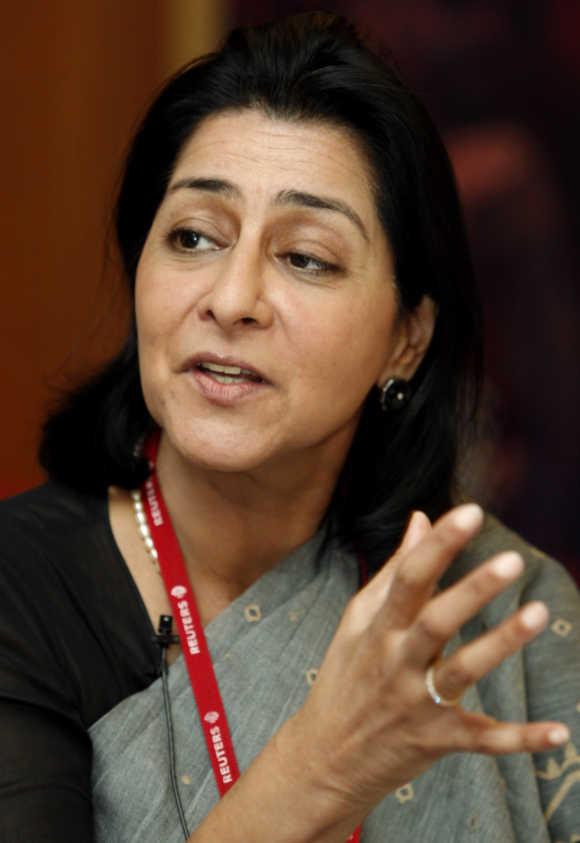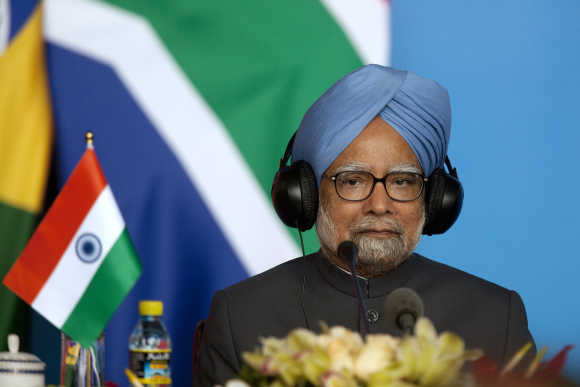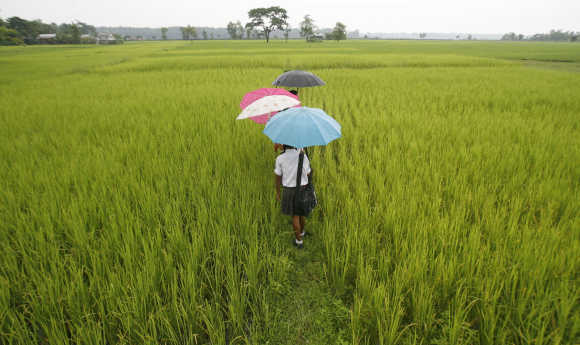Photographs: Punit Paranjpe/Reuters Faisal Kidwai in Mumbai
If you are an investor looking at the 20-year or 30-year horizon, India is still the place to be, says Naina Lal Kidwai, Executive Director, Board of Hongkong and Shanghai Banking Corporation Limited and Country Head, HSBC India.
Kidwai, who is also Senior Vice-President of Federation of Indian Chambers of Commerce and Industry, says the challenge is to harness the energy of the youth into productive areas.
Slowdown in the US or EU will have a relatively small impact on India, she tells Faisal Kidwai in an email interview.
Here are the excerpts:
You have said that India is growing at a respectable rate, then why do some investors, especially Indian investors, have a negative perception?
I am an optimist and like to look at the glass as half-full. Yes, there are problems and we all know them and the solutions as well, so why dwell on them. I still maintain that the GDP growth, while it has slowed down to 6.5 per cent in financial year 2011-12, is still respectable when compared to some other major economies.
As far as Indian investors are concerned, it is easy to slip into negativity when all you read about in the media everyday are the ills that plague the country and the economy. However, the sense that I get when I meet with investors and businesspeople is not negative but just wary and cautious. They want to have a little more clarity and certainty before they invest.
Finally, I reiterate that the long-term India story remains intact. If you are an investor looking at the 20-year or 30-year horizon, India is still the place to be and there are many, Indian and foreign investors alike who share this view.
...
India's long-term story remains intact, says Kidwai
Image: Prime Minister Manmohan Singh.Photographs: Pool/Reuters
Why do you think the Congress-led government is having such a difficult time in pushing through reforms?
I am neither part of the government nor am I privy to political deliberations, so it would be unfair on my part to comment on the matter.
...
India's long-term story remains intact, says Kidwai
Image: Schoolchildren walk through a field at Koribari village, Siliguri.Photographs: Rupak De Chowdhuri/Reuters
At the macro level, what are the main challenges facing India?
Let me put it this way, our opportunities are also our challenges. We talk of our demographic dividend but our challenge is to harness this energy of the youth into productive areas and to ensure that the future generations are well-educated with employable skills and not just degrees.
We as a country need to provide them with enough opportunities for them to sustain and increase the country's growth momentum. The National Skills Development Plan is a step in the right direction.
Similarly, unlike many developed countries we have demand, the challenge is in releasing the bottlenecks through policies and investments in infrastructure to enable supply to match the demand. For example, the inflationary pressure that we have been grappling with for the past few months has been supply-led.
Finally, we have to ensure that we monitor and manage our natural resources urgently and efficiently, and in this I also include water which is a scarce resource.
...
India's long-term story remains intact, says Kidwai
Image: A demonstrator confronts police during a protest against government austerity measures, in Madrid.Photographs: Susana Vera/Reuters
When you look at the global scenario, how hopeful are you of the economic situation getting better in Europe and US? What's the impact on India?
The eurozone crisis has been a source of volatility for asset markets, and it appears that this is set to continue. The key area of focus for policy makers will need to be to rebuild investor confidence in the institutions and mechanisms of the eurozone.
In the US, the decision by the Federal Reserve Bank on additional quantitative easing will depend critically on the strength of the labour market. If it remains weak then there is a good chance that the Fed embarks on additional easing via QE3. The uncomfortable reality is that the US, like much of the rest of the developed world, faces a period of sub-trend growth as de-leveraging proceeds.
The period over which financial infrastructure gets built - and the system stabilises for a long-term - it is fair to assume will take a number of years. The issue is much more about the confidence that people have that this result will ensue and that really needs to be the focus.
India is still a domestically driven economy with consumption accounting for 60 per cent of the economy. On the external trade front, we remain a net importing country with exports accounting for 32 per cent of GDP. Around 50 per cent of our goods and services exports are headed to the US and Europe.
Also, we are increasingly exporting industrial goods which are cyclical in nature and therefore sensitive to a slowdown in external demand.
...
India's long-term story remains intact, says Kidwai
Image: Occupy Wall Street demonstrators clash with police officers in New York.Photographs: Keith Bedford/Reuters
Still, studies show that the impact on India's growth from an external demand slowdown in the US or EU will be relatively small.
On the domestic side, poor investments have been the main issue. Investments make up around 32 per cent of GDP. During the boom years, investments grew at 16-17 per cent on an avera#8805 it has slowed to five per cent in 2011-12. It would help to have investments/foreign direct investment from offshore into India.
Financial linkages have grown stronger over the years, with Indian corporates increasingly depending on foreign funds for financing. IMF estimates that Indian corporates depend on external funds for 25 per cent of their funding needs. This has made India more vulnerable to sudden capital flow reversals.
In the event of an external shock, corporates are somewhat at risk considering relatively high leverage. Bank balances are reasonably sound but face some pressure at the moment. Large foreign exchange reserves still comfortably cover short-term external obligations and external debt is relatively low at 18 per cent of GDP. European bank claims on India at eight per cent of GDP is quite low versus BRIC (a grouping of Brazil, Russia, India and China) peers.
The HSBC Research team's view is that we will not be as decoupled from events in the EU and US as we were in 2009.






article